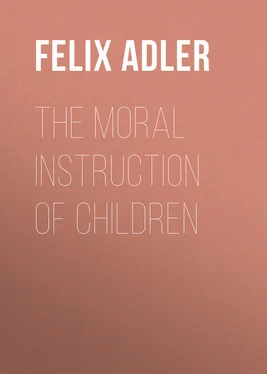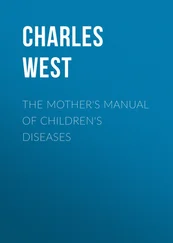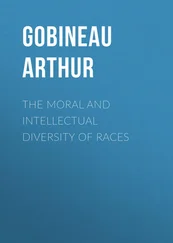Felix Adler - The Moral Instruction of Children
Здесь есть возможность читать онлайн «Felix Adler - The Moral Instruction of Children» — ознакомительный отрывок электронной книги совершенно бесплатно, а после прочтения отрывка купить полную версию. В некоторых случаях можно слушать аудио, скачать через торрент в формате fb2 и присутствует краткое содержание. Жанр: foreign_language, foreign_antique, foreign_prose, на английском языке. Описание произведения, (предисловие) а так же отзывы посетителей доступны на портале библиотеки ЛибКат.
- Название:The Moral Instruction of Children
- Автор:
- Жанр:
- Год:неизвестен
- ISBN:нет данных
- Рейтинг книги:3 / 5. Голосов: 1
-
Избранное:Добавить в избранное
- Отзывы:
-
Ваша оценка:
- 60
- 1
- 2
- 3
- 4
- 5
The Moral Instruction of Children: краткое содержание, описание и аннотация
Предлагаем к чтению аннотацию, описание, краткое содержание или предисловие (зависит от того, что написал сам автор книги «The Moral Instruction of Children»). Если вы не нашли необходимую информацию о книге — напишите в комментариях, мы постараемся отыскать её.
The Moral Instruction of Children — читать онлайн ознакомительный отрывок
Ниже представлен текст книги, разбитый по страницам. Система сохранения места последней прочитанной страницы, позволяет с удобством читать онлайн бесплатно книгу «The Moral Instruction of Children», без необходимости каждый раз заново искать на чём Вы остановились. Поставьте закладку, и сможете в любой момент перейти на страницу, на которой закончили чтение.
Интервал:
Закладка:
The Moral Instruction of Children
EDITOR'S PREFACE
Moral education is everywhere acknowledged to be the most important part of all education; but there has not been the same agreement in regard to the best means of securing it in the school. This has been due in part to a want of insight into the twofold nature of this sort of education; for instruction in morals includes two things: the formation of right ideas and the formation of right habits. Right ideas are necessary to guide the will, but right habits are the product of the will itself.
It is possible to have right ideas to some extent without the corresponding moral habits. On this account the formation of correct habits has been esteemed by some to be the chief thing. But unconscious habits – mere use and wont – do not seem to deserve the title of moral in its highest sense. The moral act should be a considerate one, and rest on the adoption of principles to guide one's actions.
To those who lay stress on the practical side and demand the formation of correct habits, the school as it is seems to be a great ethical instrumentality. To those who see in theoretical instruction the only true basis of moral character, the existing school methods seem sadly deficient.
The school as it is looks first after its discipline, and next after its instruction. Discipline concerns the behavior, and instruction concerns the intellectual progress of the pupil. That part of moral education which relates to habits of good behavior is much better provided for in the school than any part of intellectual education.
There is, however, a conflict here between old and new ideals. The old-fashioned school regarded obedience to authority the one essential; the new ideal regards insight into the reasonableness of moral commands the chief end. It is said, with truth, that a habit of unreasoning obedience does not fit one for the exigencies of modern life, with its partisan appeals to the individual and its perpetual display of grounds and reasons, specious and otherwise, in the newspapers. The unreasoning obedience to a moral guide in school may become in after life unreasoning obedience to a demagogue or to a leader in crime.
It is not obedience to external authority that we need so much as enlightened moral sense, and yet there remains and will remain much good in the old-fashioned habit of implicit obedience.
The new education aims at building up self-control and individual insight. It substitutes the internal authority of conscience for the external authority of the master. It claims by this to educate the citizen fitted for the exercise of suffrage in a free government. He will weigh political and social questions in his mind, and decide for himself. He will be apt to reject the scheme of the demagogue. While the old-fashioned school-master relied on the rod to sustain his external authority, he produced, it is said, a reaction against all authority in the minds of strong-willed pupils. The new education saves the strong-willed pupil from this tension against constituted authority, and makes him law-abiding from the beginning.
It will be admitted that the school under both its forms – old as well as new – secures in the main the formation of the cardinal moral habits. It is obliged to insist on regularity, punctuality, silence, and industry as indispensable for the performance of its school tasks. A private tutor may permit his charge to neglect all these things, and yet secure some progress in studies carried on by fits and starts, with noise and zeal to-day, followed by indolence to-morrow. But a school, on account of its numbers, must insist on the semi-mechanical virtues of regularity, punctuality, silence, and industry. Although these are semi-mechanical in their nature, for with much practice they become unconscious habits, yet they furnish the very ground-work of all combinations of man with his fellow-men. They are fundamental conditions of social life. The increase of city population, consequent on the growth of productive industry and the substitution of machines for hand labor, renders necessary the universal prevalence of these cardinal virtues of the school.
Even the management of machines requires that sort of alertness which comes from regularity and punctuality. The travel on the railroad, the management of steam-engines, the necessities of concerted action, require punctuality and rhythmic action.
The school habit of silence means considerate regard for the rights of fellow-workmen. They must not be interfered with; their attention must not be distracted from their several tasks. A rational self-restraint grows out of this school habit – rational, because it rests on considerateness for the work of others. This is a great lesson in co-operation. Morals in their essence deal with the relation of man to his fellow-men, and rest on a considerateness for the rights of others. "Do unto others," etc., sums up the moral code.
Industry, likewise, takes a high rank as a citizen's virtue. By it man learns to re-enforce the moments by the hours, and the days by the years. He learns how the puny individual can conquer great obstacles. The school demands of the youth a difficult kind of industry. He must think and remember, giving close and unremitting attention to subjects strange and far off from his daily life. He must do this in order to discover eventually that these strange and far-off matters are connected in a close manner to his own history and destiny.
There is another phase of the pupil's industry that has an important bearing on morals. All his intellectual work in the class has to do with critical accuracy, and respect for the truth. Loose statements and careless logical inference meet with severe reproof.
Finally, there is an enforced politeness and courtesy toward teachers and fellow-pupils – at least to the extent of preventing quarrels. This is directly tributary to the highest of virtues, namely, kindness and generosity.
All these moral phases mentioned have to do with the side of school discipline rather than instruction, and they do not necessarily have any bearing on the theory of morals or on ethical philosophy, except in the fact that they make a very strong impression on the mind of the youth, and cause him to feel that he is a member of a moral order. He learns that moral demands are far more stern than the demands of the body for food or drink or repose. The school thus does much to change the pupil from a natural being to a spiritual being. Physical nature becomes subordinated to the interests of human nature.
Notwithstanding the fact that the school is so efficient as a means of training in moral habits, it is as yet only a small influence in the realm of moral theory. Even our colleges and universities, it must be confessed, do little in this respect, although there has been of late an effort to increase in the programmes the amount of time devoted to ethical study. The cause of this is the divorce of moral theory from theology. All was easy so long as ethics was directly associated with the prevailing religious confession. The separation of Church and State, slowly progressing everywhere since the middle ages, has at length touched the question of education.
The attempt to find an independent basis for ethics in the science of sociology has developed conflicting systems. The college student is rarely strengthened in his faith in moral theories by his theoretic study. Too often his faith is sapped. Those who master a spiritual philosophy are strengthened; the many who drift toward a so-called "scientific" basis are led to weaken their moral convictions to the standpoint of fashion, or custom, or utility.
Meanwhile the demand of the age to separate Church from State becomes more and more exacting. Religious instruction has almost entirely ceased in the public schools, and it is rapidly disappearing from the programmes of colleges and preparatory schools, and few academies are now scenes of religious revival, as once was common.
Читать дальшеИнтервал:
Закладка:
Похожие книги на «The Moral Instruction of Children»
Представляем Вашему вниманию похожие книги на «The Moral Instruction of Children» списком для выбора. Мы отобрали схожую по названию и смыслу литературу в надежде предоставить читателям больше вариантов отыскать новые, интересные, ещё непрочитанные произведения.
Обсуждение, отзывы о книге «The Moral Instruction of Children» и просто собственные мнения читателей. Оставьте ваши комментарии, напишите, что Вы думаете о произведении, его смысле или главных героях. Укажите что конкретно понравилось, а что нет, и почему Вы так считаете.












